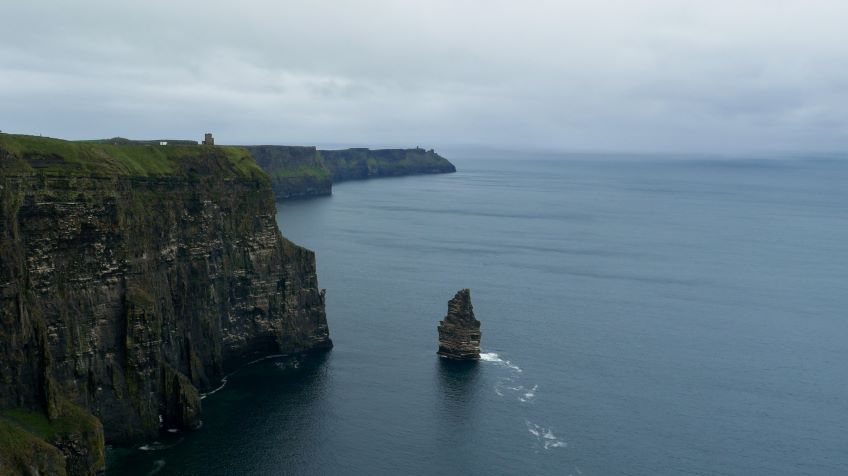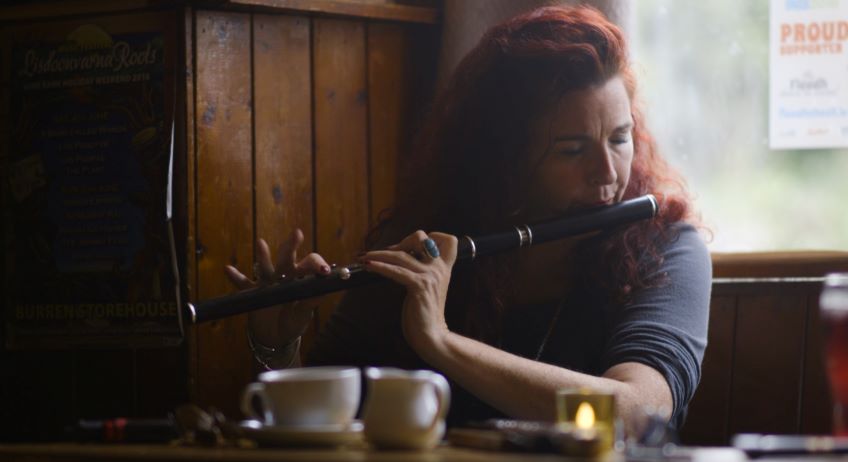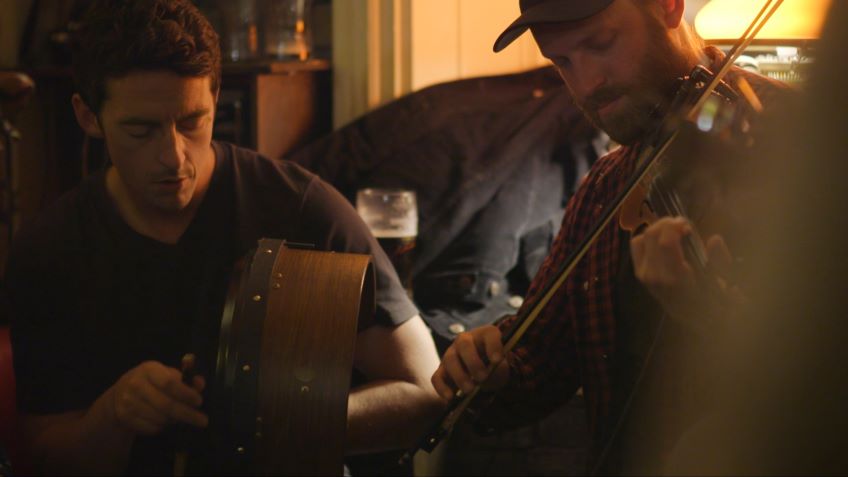Joyce Glasser reviews The Job of Songs (Available on digital download from September 25, 2023) Cert. 12, 73 minutes
The tourists exploring the beautiful County Clare, ‘a small, tiny piece of land in the middle of a huge ocean’ in the words of native musician Christy Barry, often explore The Burren, stop for a gape at the Cliffs of Moher, and might have a sighting of the island of Inishmore, made famous by Martin McDonagh’s satirical IRA play, The Lieutenant of Inishmore. But if they don’t stop off at Doolin, once a thatched village on one side of a river with no electricity or running water and little contact with the outside world, they haven’t experienced the real Clare. Doolin was put on the map after itinerant folk musicians passing through the entertainment-starved village, played and sang on the streets to villagers who gathered for this treat. They eventually learnt the songs and taught themselves how to play the instruments.
Director Lila Schmitz’s The Job of Songs, a whisper of a feature length documentary about the musicians of Doolin, County Clare, would benefit from a structured narrative, and some discussion of the instruments used, but by the end of this amiable visit, Doolin may well be a new go-to destination. You will want to stop off at Fitzpatrick’s Bar for a jam session, pop into Gus O’Connor’s pub for a singalong with 80-year-old, one-legged Tom McCormac, or pay Doolin-born Christy Barry a visit at his home, the Music House.
Barry Moore, who performs under the name Luka Bloom, is a forty-year man. He says that the magic of Ireland is the time. By that he means ‘the time spent with yourself watching the day go by, watching the boats go out, taking the time to come back in and sit and wait for the music to begin.’ Moore himself arrived in Doolin in 1974, aged 19, after hearing about the music.

This is a clever way of introducing some of the current musicians, or, like Eoin O’Neill, the announcer on Radio Clare FM, the music lovers, you are likely to bump into on a visit to Doolin. Song writer and singer Kieran O’Connell and his musician brother Jon are originally from County Clare, while O’Neill and Luka are 40-year men. Christy McNamara arrived in the “hippie boom” in the 1970s.
Ted McCormac is a 30-year-man. He ran away from home in Dublin and never returned. We hear him deliver a rousing, From Clare to Here in the pub where he performs on a regular basis. He’s unusual in the group for never having touched alcohol. ‘If I did, I’d be an alcoholic’, he says in a self-knowing way. The norm is Katie Theasby, who admits she couldn’t sing without a pint, and that musicians are sometimes paid in pints. Her dream is to be able to earn a living from her music. Her plan to release an album (she plays the whistle and sings) was delayed by responsibilities caring for her daughter. ‘Drink is a source of comfort, but of course, it can be part of the problem. But no doubt music and drink go hand in hand.’
For those who prefer to hear music outside the pub, there is Christy Barry’s the Music House, the home that he shares with his artist wife Sheila. Here the white-haired, blue eyed septuagenarian will play the flute, the whistle and the spoons to groups of tourists and friends in between chats about music and local history.
Speaking of history, Micho Russell (1915-1994), a Doolin boy who won the All-Ireland tin whistle competition, and his two brothers Packie and Gussie, are credited with putting Doolin on the map. Russell incorporated folklore and legend into his live performances, and died a musician’s death, in a car accident on his way home from a gig. Packie played in Gus O’Connor’s pub but died at 62 allegedly from too much Port, but Gussie, arguably the best musician of the three, died of old age. The musicians do not mention the role of the Irish Folklore Commission or Seamus O’Duillearga who apparently recorded the Russell’s music in the late 1930s.

Like Micho, most of the musicians in the film are self-taught, and while many had parents who played instruments, music was neither formally handed down nor taught in school. One musician remembers his father yelling through the window, ‘you’re playing it wrong’, which was about the limit to his formal training.
So what is the job of songs? “It’s sometimes to entertain, but it’s really giving people who don’t have songs permission to feel things that are deeply engrained in them, but that they don’t necessarily intellectually understand.” While laughter and joy is the dominant emotion in Anne Rynne’s (Luka Bloom’s sister) house, where she starting learning the guitar late in life, and dances around with her husband and friends, song reaches deep into the soul and unleashes pent-up emotions.
Ted, a widower whose children are far afield, lives alone, and says he manages to get by despite his disability. The State sends in someone three times a week, he jokes, ‘so at least I’ll only be three days dead at most when they find me.’ Death is not more remote than the danger signs along the Cliffs of Moher.
For a happy community united by song, Doolin is not always a happy place. When winter sets in it’s depressing, and Anne speaks of a succession of suicides. Luka Bloom talks about the sad story of the people who left Ireland from the 1840s in the great migration due to the famine and changes in land laws.
Katie Theasby envies musicians who can make a living from music. During the film we learn that she hopes to have the time to put together an album. Schmitz might have used this pretty, articulate, talented, red-head’s journey to create a narrative structure for the film and to give it a climax. For that’s what it somehow feels like when Eoin O’Neill announces that, after many years, he is finally able to play the title song from Katie’s album I Remember You Singing, and we finally hear Katie’s beautiful voice in a tear-inducing song played in its entirety.
It’s a cover of Finbar Furey’s I Remember You Singing this Song and as much a tribute to Katie’s parents as to Furey’s: and to all the parents who passed on or are passing on and celebrating the music of Doolin.




